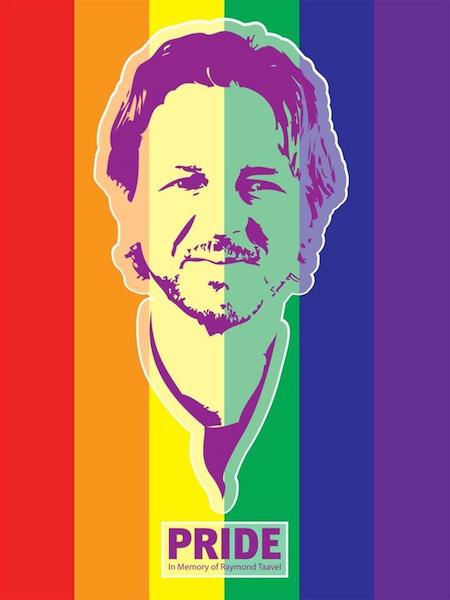“That’s where it happened.”
It’s been two years since Raymond Taavel, a prominent member of Halifax’s rainbow community, passed away due to injuries he sustained during an attack on Gottingen Street.

If you were to walk out of the very same bar that Taavel had been visiting on the night he was attacked, the first thing you would see is a wire fence. That fence is there to stop pedestrians from walking into a large pit where an abandoned building used to stand. The fence has been decorated with colourful all-weather ribbons. They’ve been there almost as long as Taavel has been gone. Walking down this street, at any time of day, you’d think it would be hard not to think of Raymond.
Two weeks ago, I took a visiting journalist around Halifax. She and I spent the day talking about all sorts of things, and at some point in our conversation, we talked shop. In my case, I mentioned that the Taavel case was my first hard-news story. I told her about how I hated having to call people and ask them about the death of someone they knew.
I remember making those calls. These were people I had known for years, as friends and acquaintances, with whom I had some form of connection. The kind of connection that usually gets stronger in times of crisis. The person on the other end of the line would pick up, and I’d say, “I’m sorry to do this, but I’m calling to ask you about Raymond. I know this is hard, so feel free to tell me to fuck off if you don’t want to talk.”
No one did.
Everyone I called wanted to talk about Raymond. Some on the record, and some off the record. The evening of Taavel’s vigil on Gottingen Street, I stood next to one of the street’s business owners and asked her if she wanted to talk. Standing next to us was a very well known and seasoned reporter of over 20 years in the industry. As he went in to ask his own questions, the owner looked at him and said, “I don’t know you. I know him,” pointing to me. “I’ll only talk to him.”
Telling Raymond Taavel’s story — today and two years ago — is not just a fact-finding news mission. It’s the story of a man who did a lot of work for the queer community in Halifax, and in Nova Scotia. It’s the story of a street and a neighbourhood that feels that it is misrepresented by the media. Taavel’s death could easily be just another way to represent Gottingen Street and Halifax’s north end as an unsafe place.
It’s also the story about the safety of LGBT people, a tale that was recently revisited in the case of Scott Jones. In fact, Taavel’s violent passing is what I thought of when I first heard about Jones, another gay man attacked in Nova Scotia. An editor from Vice magazine contacted me and asked, “Is it safe to be queer in Nova Scotia?” This is what people had come to ask themselves when they think of this part of the country.
My journo friend and I decided we’d had enough shop talk and wanted to go out for a drink. I decided to take her to a great little spot on Gottingen Street. As we were driving down, I mentioned how I used to live in the neighbourhood. I knew people who lived in the area, longtime residents and newcomers. I missed living there. I spotted a parking spot and as we pulled in, I noticed the fence.
“That’s where it happened,” I said. “That’s where Raymond, the man I was telling you about before, was killed.”
And then I realized that very soon, it would be the anniversary of that day. I’d gotten so used to seeing that fence, those ribbons, this streetscape, that I had forgotten about why it was the way it was. I’d grown accustomed to walking by where a man had died.
Depending on which side of that ribbon-strewn fence you find yourself, two years can seem like the blink of an eye or a staggeringly slow pace for events to unravel.
Seventeen months after Taavel’s passing, the province of Nova Scotia and the local health authority had undergone a review, and the majority of the recommendations placed therein had been put in place.
Andre Noel Denny, the man accused in the second-degree murder of Taavel, has undergone a lengthy psychiatric assessment and is due to stand trial in September of this year.
Last year, on the first anniversary of Taavel’s death, his former partner and members of his family decided to sue the health authority that ran the institution where Denny was held — he was there, as he was found not criminally responsible on a charge of assault causing bodily harm — the provincial attorney general and Taavel’s accused killer, Andre Denny. One year later, the group has stated that they will drop the suit if the province of Nova Scotia changes the ways it monitors patients who could be potentially violent and who have been found not criminally responsible for their actions.
*
It’s too easy to forget what happened 24 months ago, even when you have to walk by a daily reminder of it. It can hurt to live with that pain. We can put it somewhere else. Today, I’m going to remember it.

 Why you can trust Xtra
Why you can trust Xtra


